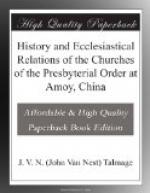1. The most important is, or is supposed to be, that there will thus be higher courts of jurisdiction to which appeals may be made, and by which orthodoxy and good order may be the better secured to the Church at Amoy. Such advantages, if they can be thus secured, we would by no means underrate. There sometimes are cases of appeal for which we need the highest court practicable—the collective wisdom of the Church so far as it can be obtained; and the preservation of orthodoxy and good order is of the first importance. Now let us see whether the plan proposed will secure these advantages. Let us suppose that one of the brethren feels himself aggrieved by the decision of the Classis of Amoy, and he appeals to the Particular Synod of Albany, and thence to the General Synod. He will not be denied the right to such appeal. But, in order that the appeal may be properly prosecuted and disposed of, the appellant and the representative of Classis should be present in these higher courts. Can this be secured? Is the waste of time, of a year or more, nothing? and where shall the thousands of dollars of necessary expense come from? Now suppose this appellant to be a Chinese brother. He also has rights. But how, on this plan, can he possibly obtain them? Suppose (which of itself is an absurdity) that the money be raised for him, and he is permitted to stand on the floor of Synod. He cannot speak, read, or write a word of English. Not a member of Synod can speak, read, or write a word of his language, except it be the brother prosecuting him. I ask, is it possible for him thus to obtain justice? But, waiving all these disadvantages, the only points on which there is the least probability that an appeal of a Chinese brother would come up before the higher courts, are points on which these higher courts would not be qualified to decide. They would doubtless grow out of the peculiar customs and laws of the Chinese—points on which the Missionary, after he has been on the ground a dozen years, often feels unwilling to decide, and takes the opinion of the native elders in preference to his own. Is it right to impose a yoke like this on that little Church which God is gathering by your instrumentality in that far-off land of China? But it is said, that these cases of appeal (because of impracticability) will very rarely or never happen. Be it so; then this supposed advantage will seldom or never occur, and if it should occur, it would prove a disadvantage. The highest practical court of appeal for the native churches can be secured only on the plan for which the Missionaries contend. Why must we deprive the native Christians of the benefit of the collective wisdom of all the churches of like doctrine and order among them?




